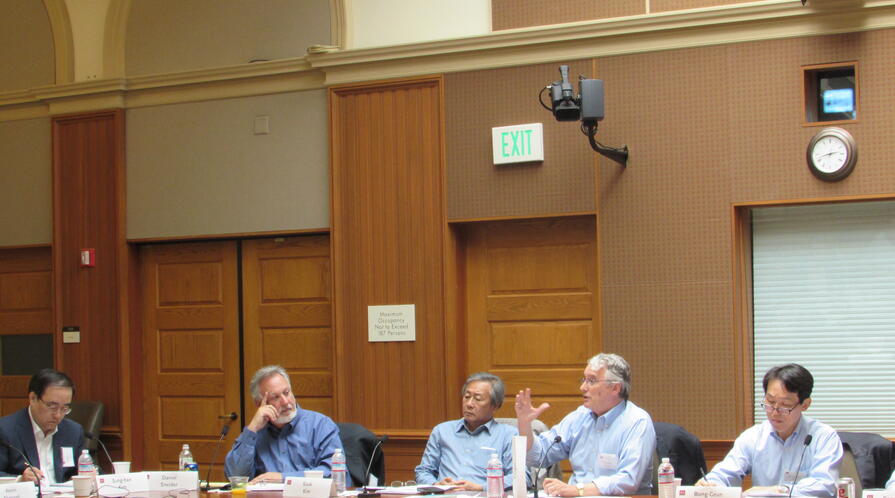Security cooperation and confidence-building are key to Northeast Asia’s stability, experts say

Update: A full report summarizing the discussion of the 12th Korea-U.S. West Coast Strategic Forum is available below.
Northeast Asia has been rife with animosity over the past year. Among the outstanding concerns are China’s naval movements in the South China Sea and the threat of a fourth nuclear missile test by North Korea. While no major incidents have occurred in recent months, the uncertainty weighs heavily on policymakers and observers. What if an accidental clash happens in the sea or air?
Senior security scholars and practitioners from South Korea and the United States recently gathered for the Korea–U.S. West Coast Strategic Forum, a Track II workshop to exchange views on these major issues impacting the Northeast Asia region.
The Strategic Forum, established in 2006, is held semiannually and alternates between Seoul and Stanford, hosted by the Korean Studies Program at the Shorenstein Asia-Pacific Research Center. The Korean counterpart organization is the Institute of Foreign Affairs and National Security, the foreign ministry’s think tank within the Korea National Diplomatic Academy.
Twenty-four participants gathered on June 20 at the Bechtel Conference Center, and offered a diversity of opinions on Korean peninsula issues and the potential impact they could have on the countries’ allies. The participants collectively expressed a desire for regional stability, increased dialogue, and commitment to maintaining the U.S.–ROK alliance and cooperation on other trust-building activities.
The conference operates under the Chatham House Rule of individual confidentiality to allow for candid conversation. A few main points from the sessions are disclosed below:
Session I: Northeast Asia Regional Dynamics
Many participants shared the concern that trilateral relations between China–South Korea–Japan are at one of the worst points in recent history.
China’s current attitude toward its neighbors and the United States was discussed at length. Many participants discussed the strategic trajectory of China and how the country’s domestic situation may challenge its ability to effectively move forward, contrary to popular perceptions that simply straight-line its current growth rate into the indefinite future.
Korean participants expressed concern toward Japan’s position, particularly following Prime Minister Shinzo Abe’s visit to Yasukuni Shrine and the stance he has taken on other wartime issues like “comfort women.” They said they hoped the United States would do more to help Korea–Japan relations, as participants recognized the desirability of increased trilateral U.S.–Japan–Korea security and diplomatic cooperation.
Session II: U.S.–Korea Free Trade Agreement (KORUS FTA)
Participants shared the view that the U.S.–Korea Free Trade Agreement (KORUS FTA) is serving to broaden and deepen the U.S.–ROK relationship.
The KORUS FTA is only in its second year of implementation, so additional time is needed to make a comprehensive evaluation, but it appears that it will significantly increase bilateral trade as time passes.
Session III: U.S.–ROK Alliance
The U.S.–ROK relationship, on the whole, is in very good shape. South Korea and the United States have similar policies in most strategic areas.
The two countries cooperate on many diplomatic and security initiatives, such as the U.S. 28,500-strong troop presence in South Korea and many United Nations peacekeeping missions abroad.
Session IV: North Korea
Participants agreed that North Korea continues to engage in provocative behavior. This remains the chief concern of the U.S.–ROK alliance, as well a priority of the international community in total.
The policies of the United States and South Korea toward North Korea are well-coordinated and principled, but a number of Korean and American participants expressed concern that more creative thinking was needed, as the challenges North Korea poses are increasing.
Reports from past forums are available on the Shorenstein APARC website.
